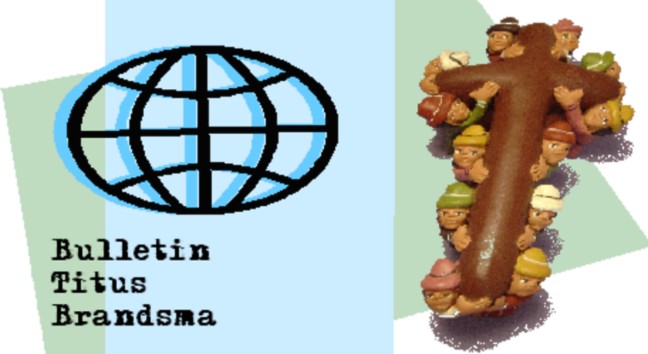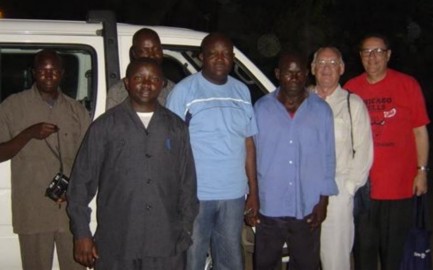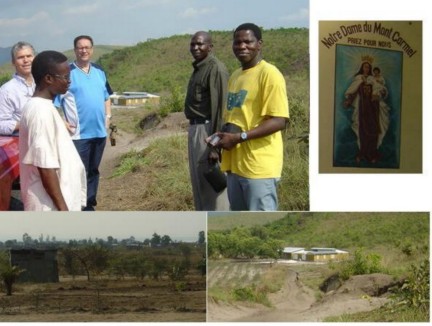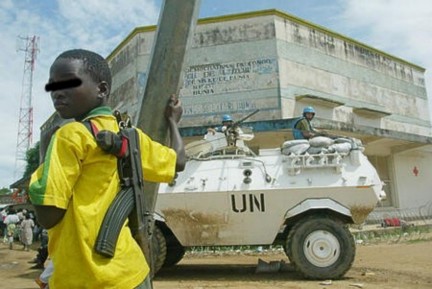|
CITOC
Annual Meeting of the Order’s International Commission of Justice and Peace Held in Kinshasa, D.R. Congo The International Commission of Justice and Peace of the Carmelite Order met in Kinshasa (Democratic Republic of the Congo) October 2-7, 2004. The purpose of holding the meeting in Africa was primarily to meet with the brothers and sisters in the Congo. It was the firm decision of the members of the Commission to show our fraternal solidarity with them. However, some members of the Commission were not able to be present. The first three days were spent meeting and listening to the people and our brothers who live in Kinshasa. The Commission met with our brothers from the Isidore Bakanja House in Kinshasa. They spoke to us about the attention that must be given to the Human Rights in the Congo because of the very fragile situation of democracy in the country. "Justice and Peace recalls the importance of valuing the human person as a creation of God in order to stress the respect due Human Rights." The actions of the war and of the guerillas are the aggravating cause of poverty and the continuing cycle of corruption. They spoke of the importance of letting other countries know about the situation. The Carmelite charism and spirituality directs us to work for justice and peace, following the example of the Prophet Elijah, starting with prayer, to establish links of solidarity with the poor in order to take creative action. The meeting with the Justice and Peace Commission of the parish in Kinshasa and of the Commissariat made members very concretely aware of the reality of the Congolese people both in Kinshasa as well as throughout the country. Again the theme of war as the cause of the human and economic misery of the country was clear. A war, like that in the Congo, is stimulated by the interests of the rich countries and by the large companies interested in the natural resources of the country, especially cobalt considered the "god of the XXI century" for its value to the electronic and information industries. There is an interesting work developing in the field of justice and peace as mediators of reconciliation in the daily conflicts. In the areas of Ituri, Bunia and Nioka, the war has caused great human suffering with terrible injuries to the child soldiers. The Carmelites, with the Commission of Justice and Peace, are attempting to help these children emerge from the never ending violence in which they find themselves. A meeting with the Sisters of Nostra Signora dell’Orto made us aware of the other dramatic situations of women, of the children and of the families. The women of the city are more harmed than those of the rural area, since they have to work longer and still have nothing to eat while those on the farms at least have something to eat. Besides the tragedy of violence and the exploitation of the women and young girls is rather common. They are married as soon as their first menstral period arrives and can be abandoned with the children of the husband whether or not they are hers. Women and children can be abandoned under the accusation of witchcraft which means that the number of street children increases enormously. It is estimated that there are 20,000 abandoned children on the street of Kinshasa. The large presence of the pentecostal sects reinforces this superstition of witchcraft. In addition, the difficulty of attending school and the little interest shown by the parents is creating an alienated generation, quite willing to become involved in various kinds of exploitation. Following these initial meetings, the International Commission for Justice and Peace and the Integrity of Creation (JPIC) met on its own to make the following decisions. Because of the value of holding a meeting "in the field," such as this meeting in the Congo, we made the decision to hold the next Commission meeting in Curitiba, Brazil, from August 26 – September 2005. This will focus on the Rule of Carmel at the service of justice and peace and social inclusion. The members of the Commission are also thinking about a course for the Justice and Peace coordinators of the Carmelite Family (men, women, lay, religious) around the end of July or beginning of August 2006, at Fatima, Portugal. The theme would be centered on justice and peace and the Carmelites in the Globalized World. The book series "Zelo Zelatus," already with six titles ready for published in their original language on the internet and in simple booklets is available for the readers to translate or to publish. The Commission only asks to be advised of their publication and to receive some copies for the archives. Members exchanged our own personal experiences in the field of justice and peace during the 2003-2004 year. The Commission discussed the idea, coming from a meeting with the Dominicans, to promote among ourselves a reflection on equitable commerce and agreements and investment ethics, already practiced in some of our provinces and houses. This is a discussion that involves our vow of poverty lived collectively and the updating of our style of life of poverty. Who knows if in the next General Chapter we could present the argument concretely in the form of a proposal. We wrote two messages. One is a letter of thanks to the Prior General for his letter "The God of Our Contemplation" and the other to Fr.. Ismael Checa, O. Carm. In the next year, we will seek to create statutes for the JPIC Commission, constitutions, tasks and methods of working, that would then be studied and approved by the General Council. Already, underway in Rome, is a series of meeting for those working in justice and peace within the medicant religious family. The idea is to deepen and update our work in the field of justice and peace. For those who are interested in helping the Carmelite NGO, we are suggesting the willingness of our members and others to participate at the meetings of the UN in other places around the world, such as FAO (Rome), UNESCO, OMS, etc. There will be the start of an attempt to articulate the justice and peace work in the six geographic regions where the Carmelite Family is present: Africa, Northern Europe, South America, North America and the Caribbean, Asia and Australia, the Mediterranean and Eastern Europe. There was note of some days to remember: September 21: World Day of Prayer for Peace; December 1: World Day Against AIDs; December 10: World Day for Human Rights; August 6: Day of Rememberance of Hiroshima; February 16: Day of the Christian Journey Towards Peace (a remembrance of the massacre of Christian in Kinshasa). We were glad to hear about the day of dialogue between the three religions of Abraham, celebrated each year on the last Friday of the month of Islamic Ramadam. We have suggested it as a day of commitment for the Carmelite Family. This is a commitment to peace that is found in our Elian identity. Our participation in various social fora is an important resource of ideas and allows a deeper understanding of the social struggle to create another possible world. We find it timely to gather together the documents in the area of justice and peace that perhaps come from other countries and from other situations, containing various pieces of information, that will be made in Rome by the Secretary of the Justice and Peace Commission. The Titus Brandsma Bulletin, bringing news and experiences of justice and peace to the Carmelite Family, will continue to be part of CITOC, as is the current practice. The possibility of developing some kind of identification for those members of the Carmelite Family working in the justice and peace field, as well as reestablishment of democracy, and humanitarian missions was discussed. Such identification would be given under special conditions and subject to the approval first of the General Council of the Order. Why a Health Center in Mpassa, in the Area of N’Sele in Kinshasa?
This is the plan of the Carmelites in order to stand with the poor in an attempt to reduce lack of opportunities present. This center will be part of a strategy of community support, building a center point for the community efforts. The idea is to get a national mechanism functioning which will support and harmonize the community dynamic with the finality of creating the conditions for lasting and equal growth, following a spirit of lasting human development. Founded on the needs of the people, this support to the community seeks to reduce the disparity and injustice that have developed between the rural and urban environments on the one hand and between the richer and poorer regions on the other hand. Choosing health system in this area, the Carmelites want to bring the poor people closer to the needed basic health services. It is hoped to decrease the very high mortality rate which is due to generally deteriorated conditions. The community has been hard hit with regards to living conditions, the infrastructure, and services. The population on the African continent has grown tired of the demographic talks of the governing classes. They need an active solidarity which responds to the Carmelite plan "Prayer – Active Solidarity – Creative Action." It is in this sense that the Carmelites live and witness to their life of prayer, that builds solidariety with the poor. For this reason, the construction of the multipurpose center in Mpassa is the creative response according to the expressed needs of the local population. "CTO" Program: Saving the Children The abbreviation "CTO" means "Transition/Passage and Orientation", created by CARITAS of the Diocese of Bunia, Democratic Republic of the Congo, under the auspices of the Justice and Peace Commission. The purpose is to save the children who have not yet attained the age for military service or for enlistment but, because of the situation of war and violence in the last several years in Africa and especially in the DR Congo, have been dragged into military service. CARITAS, with government authorities, the UN Mission in the Congo (MONUC), and the local district authoritites are going forward with the recruitment of child soldiers for both male and female CTOs. In these centers, there are teachers who have received specialized training in teaching these children. The education program seeks to help the young people become aware of their personal dignity even at a young age. After this period of recovery, when they have, as much as is possible, returned to become children again, they are reintegrated with their families or others who take them in, hopefully in their native village. Their future formation is the responsibility of the CTO.
In the region and its insecure and violent surrounding area, the recruitment of children of both sexes to serve in the armed groups is common. Many of the children flee their homes. Some seduced by the weapons. Others have already lost their whole families and have no one else to look after them. So the children take up arms to survive and to be protected. Those who wish to have more information or to help with some of the projects underway in the Congo can contact Fr. Desiré (audesire@yahoo.fr) or Fr. Chelo (chedhephore@hotmail.com) To Know More about Africa:
|
|
|
RETURN TO THE
INDEX FOR CITOC 2004 |
RETURN TO THE INDEX FOR THIS ISSUE
OF CITOC INDEX OF CARMELITE
WEBSITES |


 The
Carmelites of the DR Congo are constructing a multiuse center on the
outskirts of Kinshasa. Located 24 km from the center of the city, the
center will provide health and maternity care and instruction in farming
in an area that is almost completely agricultural with a rural population
with the lowest income of Kinshasa.
The
Carmelites of the DR Congo are constructing a multiuse center on the
outskirts of Kinshasa. Located 24 km from the center of the city, the
center will provide health and maternity care and instruction in farming
in an area that is almost completely agricultural with a rural population
with the lowest income of Kinshasa.  The
northeast region of the Democratic Republic of the Congo, along the border
of Rwanda, Uganda, and Buruni, is one of the hardest hit by recent armed
conflict throughout the area. The inter-ethnic conflicts, general
insecurity, violations of human rights, and the misery of the people are
some of the sad realities of this area of the Congo.
The
northeast region of the Democratic Republic of the Congo, along the border
of Rwanda, Uganda, and Buruni, is one of the hardest hit by recent armed
conflict throughout the area. The inter-ethnic conflicts, general
insecurity, violations of human rights, and the misery of the people are
some of the sad realities of this area of the Congo.